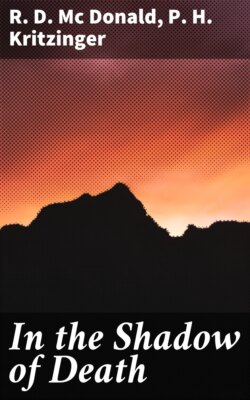Читать книгу In the Shadow of Death - P. H. Kritzinger - Страница 15
На сайте Литреса книга снята с продажи.
LADYBRAND VISITED.
ОглавлениеTowards the end of July, 1900, Prinsloo's surrender took place. Those of us who escaped the trap laid left for Heilbron with the hope of meeting De Wet's commando there. Near Heilbron we heard the dismal news that he was forced over the Vaal and was being driven northward by some 40,000 troops. This, led us to change our course and move in the direction of Winburg.
On the morning of the 27th of August we made an unsuccessful attack on Winburg. Olivier, with 27 men, got captured. The burden and responsibility of leading others was then first placed upon my shoulders. I was elected commandant.
Frustrated in our attempt to seize Winburg, we resolved to attack Ladybrand, which was not strongly garrisoned. Having encamped at Koeranerberg—a mountain 30 miles west of Ladybrand—we mustered our forces, took three guns and about 800 burghers, and left for the village.
It was a bitterly cold night—one of those nights which one can hardly forget. We rode till sunrise without off-saddling once. At 9 P.m. we halted to prepare a hasty supper. How we enjoyed that! A few days before, the enemy had unwillingly provided us with sugar, coffee, milk, butter and cheese. Owing to the intense cold the men that had no overcoats wrapped themselves up in their blankets, in which they appeared before the village just as the sun was rising.
Commandant Hertzog, on our arrival, despatched a messenger under a flag of truce to demand the surrender of the garrison. In reply he received a message to the effect that it would be much better if he would come in himself and lay down arms; that would put an end to the business much quicker. On receiving this answer we at once began to bombard the forts of the enemy, with the result that almost all their horses took to flight and fell into our hands, while some of them were wounded and killed.
General Fourie, Commandant Nieuwhoudt and myself, with a number of daring volunteers, made for the village. We reached a few houses safely, and under cover of these we succeeded in forcing the enemy to retreat to their forts and skanzes at the foot of Platrand—a mountain to the south-east of the village and very near to it. Gradually we occupied more and more of the village, and before sunset we were in possession of the whole of it.
The enemy was, however, so strongly entrenched that, in spite of their small numbers, it was impossible to compel them to capitulate without incurring the risk of sustaining heavy losses. For at the base of the mountain are natural forts and grottoes, against which lyddite shells would spend their force in vain. All we could do was to keep the foe in their haunts by directing such a fire against them that they could not venture even to peep out. In doing this the commandoes could requisition—loot, as some would say—what they required.
During the night the enemy shifted and occupied other positions. At daybreak they took vengeance on us from these positions. It did not take a long time to silence them for the rest of the day.
The following two days we remained in the village, keeping the enemy at bay. We had hoped that eventually their rations would run short, and thus bring about their surrender. Unfortunately our hopes were not to be realised; they were only too well provided. Then, again, we thought that thirst might prove an irresistible force in our favour; but in this, too, we erred, for in their grottoes was abundant water.
On the second day of the attack we placed one of our guns in the centre of the village, whence we shelled the enemy's forts, but all to no purpose. On the evening of the third day we heard that relieving forces were at hand, and as we had received a message from De Wet to meet him in Bothaville district, we left Ladybrand at dusk.
During the three days' fighting only a few burghers were wounded. As the enemy fired at random into the village, some of the inhabitants were also injured. A young man was mortally wounded, while a bullet shattered the arm of a woman.
Our efforts were rewarded by the seizure of the enemy's horses, which we valued even more than their persons. The horses we could keep and use, the men we had to dismiss again. We returned to the laager well supplied with clothes and foodstuffs. But for some traitors, who assisted the enemy, the garrison would in all probability have fallen. These, dreading the results of a capitulation, held out until relieved.
As this was our first visit to Ladybrand since its occupation, the joy of the Boer families in meeting relatives and burghers was indeed great. They welcomed them with open arms, and during their short stay it was their delight to minister unto them. We shall ever gratefully remember the hearty reception which was extended to us by the Ladybrand Africanders. Were they not prosecuted after our departure for welcoming and receiving their kith and kin?
